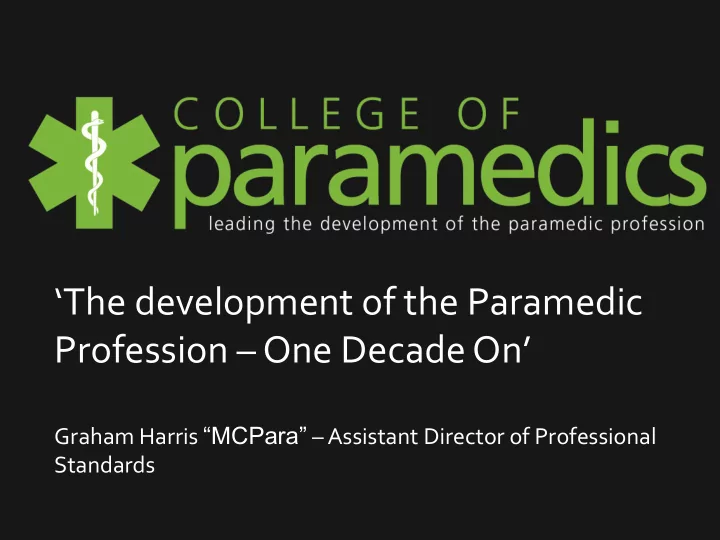

‘The development of the Paramedic Profession – One Decade On’ Graham Harris “MCPara” – Assistant Director of Professional Standards
Head of Administrative Services The College of Paramedics The Exchange, Express Park, Bristol Road, Bridgwater TA6 4RR 01278 420014 www.collegeofparamedics.co.uk
Funded part-time positions Chief Executive Management Accountant (Consultant) Membership Secretary Office Manager Events and Partnerships Coordinator
Voluntary positions Chair Vice Chair Director of Professional Standards Assistant Director of Professional Standards Director of Membership Services Assistant Director of Membership Services Director of Media Relations Council Members and Alternates Project Leads (Stroke; Sepsis and Prescribing)
Paramedics first became registered in 2000 with the [then] Council of Professions Supplementary to Medicine (CPSM). With the introduction of the [then] Health Professions Council a Professional Body was needed. British Paramedic Association (College of Paramedics) was formed in 2001 as the Professional Body for Paramedics.
In 2003 approximately 7500 Paramedics applied and placed on the Health Professions Council (HPC) register. And the first edition of the Standards of Proficiency – Paramedics was published. In 2004 the Quality Assurance Agency published the Paramedic Science Benchmark statement (QAA, 2004). The Chair of the Committee is currently the Chair of the College of Paramedics .
In 2004 the first National Joint Royal Colleges Ambulance Liaison Committee (JRCALC) Clinical Practice Guidelines – For use in UK Ambulance Services was published. In 2005 Taking Healthcare to the Patient – Transforming NHS Ambulance Services (DH, 2005). This recommended, “....that there should be a move to higher education delivered models of training and education for ambulance clinicians”.
In 2006 following the recommendations of the Bradley Report, the UK Ambulance services merged into the (11) England, plus Scotland and Wales Regional Trust, and the Northern Ireland Health Board, and commenced the transition to higher education. In 2006 the 2 nd edition of National Joint Royal Colleges Ambulance Liaison Committee (JRCALC) UK Ambulance Service Clinical Practice Guidelines was published.
In 2006 the British Paramedic Association – College of Paramedics published the Curriculum Framework for Ambulance Education (BPA, 2006). The document also introduced a career framework for Paramedics. Student Paramedic; Paramedic; Specialist Paramedic, Advanced Paramedic; Consultant Paramedic, and finally Clinical Director of Services.
CPD Career Framework Clinical Director 9 of Service Academic Level Consultant 8 Paramedic Advanced 7 Paramedic Specialist 6 Paramedic Paramedic 5
In February 2008 the College of Paramedics – British Paramedic Association published the second edition of Curriculum Guidance and Competence Framework. In October 2008 the Journal of Paramedic Practice was launched, the official partner journal of the College of Paramedics.
In 2009 the Professional Body introduced the ‘Carol Furber Award’. This is awarded to the author of the best presented case study which is judged by the Education Committee and recommended to Council. In 2009 The British Paramedic Association/College of Paramedics, became the “College of Paramedics”. In 2009 the College of Paramedics set up Regional groups with the responsibility of developing the profession on a local level.
Regional CPD Events ▪ Conferences/Exhibitions Regional Groups have ▪ Journal of Paramedic Practice an Elected Council ▪ Standby CPD Member and an ▪ Equipment Suppliers Alternate Member. ▪ Other Retailers Also Military and Online shop independent sector. Advice There is also a Student Regular Newsletter Elected Council Member and an Alternate Student Member. https://www.collegeofparamedics.co.uk/home/
Paramedics have developed not just clinically, but are also developing into Academia, Research and Management. Paramedic literature is continually being published which is becoming the required reading.
In 2011 A report into the cost effectiveness of Critical Care Paramedics delivering pre-hospital trauma and resuscitation care was published. In 2012 the College of Paramedics commissioned the Paramedic Evidence-based Project (PEEP) to progress the strategic direction of standardisation of education and training including fair access to funding support and enhancing the threshold of entry to the profession.
In January 2012 the College of Paramedics introduced Endorsement of HE programmes which met the College’s Curriculum Guidance. In August 2012 an application for Paramedics to become part of the NHS Bursary scheme was submitted by the College of Paramedics. In the UK HEI’s there are currently 30 Higher Education programmes in Paramedic Science/Practice of the 47 approved by the Health and Care Professions Council (HCPC).
In 2013 the 3 rd edition of the College of Paramedics Curriculum Guidance will be published. In 2013 The Standards of Proficiency – Paramedics will be reviewed initially by the professional body and will link to the change of the entry level threshold.
Over 4500 Registered Members Full Associate Student (over 1000 currently on HEI programmes) Fastest Growing Professional Body in UK Paramedic HCPC registrants: 19,116 (01/01/13)
UK Pre-hospital Sepsis Working Party Higher Education Ambulance Development Group (Surviving Sepsis Campaign) (HEADG) Health and Care Professions Council Forum for Higher Education in Paramedic Science (FHEPS) Ambulance Infection Control Group Joint Royal Colleges Ambulance Liaison Committee Allied Health Professions Federation (JRCALC) Clinical Guidelines Group The Trauma Care Council UK Stroke Forum The National Ambulance Research Department of Health Steering Group Ambulance Workforce Forum Connecting for Health Faculty of Forensic and Legal Medicine National Ambulance Education & Development Forum The College attends many national meetings and groups each year to represent the views and interests of the paramedic profession. This is not an exhaustive list but is an indication of the breadth of our work.
Where will the Profession be in another decade ? The Royal College of Paramedics Leading the development of the paramedic profession
ANY QUESTIONS? Thank You
Recommend
More recommend